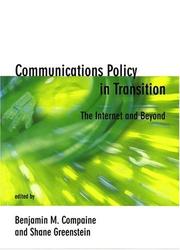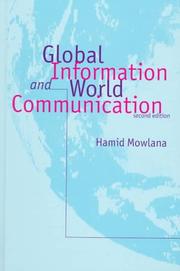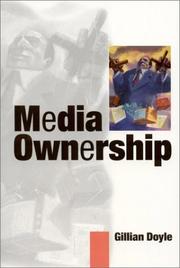| Listing 1 - 10 of 15 | << page >> |
Sort by
|
Book
ISBN: 9014025238 9789014025230 Year: 1977 Publisher: Alphen aan den Rijn Samsom
Abstract | Keywords | Export | Availability | Bookmark
 Loading...
Loading...Choose an application
- Reference Manager
- EndNote
- RefWorks (Direct export to RefWorks)
Mass communications --- Netherlands --- Mass media --- Social aspects --- 654.19 <492> --- #SBIB:309H1012 --- mediabeleid --- Nederland --- eu-nede 090.2 --- 654 --- Mediabeleid --- Media: communicatiepolitieke aspecten / mediabeleid (nationaal en internationaal) --- massamedia, publiciteitswezen, audiovisuele media - Nederland --- Mass communication --- Media, Mass --- Media, The --- Communication
Multi
ISBN: 9783031050206 9783031050190 9783031050213 9783031050220 3031050207 3031050207 Year: 2022 Publisher: Cham Springer International Publishing, Imprint: Palgrave Macmillan
Abstract | Keywords | Export | Availability | Bookmark
 Loading...
Loading...Choose an application
- Reference Manager
- EndNote
- RefWorks (Direct export to RefWorks)
The book offers a critical map to navigate the field of media governance. A thread of cosmopolitan critique connects the fourteen chapters to enhance media governance literature beyond the West and regional foci. The first part addresses the epistemological and ontological flaws in the use and adaptation of media governance. The second part opens pathways for critique and provides a thorough understanding of the ambivalences that scholars encounter when addressing media governance as a field of study. The third part highlights shortcomings like geographical narrowness and tensions in the use of media governance concepts. The scholarly contributions show that media governance as a field of study is far from being established: its conceptualizations are in flux and need scholarly self-reflection, and ongoing discussions need to leave behind universalist conceptualizations and methods of analysis. The chapters reflect on hegemony, power, sovereignty, and identity as conceptual center points in media governance research. The book uniquely breaks with self-referential Western academia and is part of ongoing collaborative scholarly efforts towards epistemic transformation through dialogue. Sarah Anne Ganter is Assistant Professor of Communication and Cultural Policy in the School of Communication at Simon Fraser University in Vancouver. Her work is influenced by a cosmopolitan approach to academic work, integrating scholarly work from different cultural, linguistic and geographical academic settings She has published widely on media governance, digital policy and regulation, and journalism, and analyzes media and digital policy transformations from a theoretical perspective that focuses on the dynamics and interactions shaping institutional fields. Her work is published in scholarly journals, international book projects, including the co-authored book "The Power of Platforms: Shaping Media and Society." Hanan Badr is Professor for Public Spheres and Inequalities at the Department of Communication, University of Salzburg, Austria. Her work focuses comparing media systems, diversifying communication research, globalization and digitization transform journalism and She held positions at Freie Universität Berlin, Cairo University, Gulf University for Sciences and Technology and Orient-Institut Beirut. Her work was published in Digital Journalism, International Communication Gazette, Media & Communication and Media, War & Conflict. Hanan won awards including the Kluge Fellowship at the Library of Congress and the DAAD Scholarship Award. She was elected as a Vice-Chair for the Activism, Communication and Social Change at the International Communication Association and serves as Regional Liasion Coordinator for AEJMC International Communication Division ICD.
Politics --- Law --- Mass communications --- mediacultuur --- mediabeleid --- massacommunicatie --- massamedia --- media --- politiek --- globalisering --- Cosmopolitanism. --- Mass media --- Mass media policy. --- Political aspects.
Book
ISBN: 9789461172280 9461172281 9789461172563 Year: 2021 Publisher: Brussel Academic & Scientific publishers
Abstract | Keywords | Export | Availability | Bookmark
 Loading...
Loading...Choose an application
- Reference Manager
- EndNote
- RefWorks (Direct export to RefWorks)
Onze media staan vandaag voor gigantische uitdagingen. Businessmodellen worden grondig door elkaar geschud, mediagebruik verschuift van klassieke mediakanalen richting online en mobiel, en lokale mediamerken nemen het steeds meer op tegen internationale spelers zoals Netflix, Facebook of YouTube. Waar we onze favoriete fictiereeksen kijken, welke persoonlijke data we delen met anderen, waar we betrouwbaar nieuws halen en wie beweert geloofwaardig nieuws te brengen: allen zijn ze het laatste decennium aan grote verandering onderhevig. Tegelijkertijd wordt onze samenleving complexer en geconfronteerd met polarisering en de uitholling van het democratisch debat, uitdagingen op het vlak van inclusie en diversiteit, en de blijvende bestendiging van maatschappelijke ongelijkheid.Dit boek bundelt de resultaten van de leerstoel 'Media in een samenleving in transitie', een onderzoekssamenwerking tussen VRT, Universiteit Gent en Vrije Universiteit Brussel. Het toont de raakvlakken tussen media-innovatie en maatschappelijke breuklijnen, en welke uitdagingen deze stellen voor de toekomst van het Vlaamse medialandschap. https://www.aspeditions.be/nl-be/book/media-en-innovatie-in-een-veranderende-samenleving/18610.htm
Media --- Mediabedrijf --- Mediabeleid --- Mediaconsumptie --- Mediaonderzoek --- Mediawetenschap --- Communicatiewetenschap --- #KVHA:Media --- #KVHA:Media; Vlaanderen --- #KVHA:Media-innovatie --- #KVHA:Maatschappij --- 090 --- media --- communicatie --- massamedia, publiciteitswezen en audiovisuele media --- Mass communications --- media-industrie --- sociale media --- massamedia --- media-analyse --- Mediabeleid ; Vlaanderen --- Maatschappij en media --- Innovatie --- Samenleving --- #SBIB:309H1000 --- Media: algemene en theoretische werken --- Flanders --- informatie --- podcasts --- film --- netflix --- televisie --- internet --- 130.2 --- mediakunde --- mediatheorie --- Telecommunication services

ISBN: 0262270714 0585446490 9780262270717 9780262032926 0262293390 9780585446493 0262032929 9780262293396 Year: 2001 Publisher: Cambridge MIT press
Abstract | Keywords | Export | Availability | Bookmark
 Loading...
Loading...Choose an application
- Reference Manager
- EndNote
- RefWorks (Direct export to RefWorks)
Until the 1980s, it was presumed that technical change in most communications services could easily be monitored from centralized state and federal agencies. This presumption was long outdated prior to the commercialization of the Internet. With the Internet, the long-forecast convergence of voice, video, and text bits became a reality. Legislation, capped by the Telecommunications Act of 1996, created new quasi-standards such as "fair" and "reasonable" for the FCC and courts to apply, leading to nonstop litigation and occasional gridlock. This book addresses some of the many telecommunications areas on which public policy makers, corporate strategists, and social activists must reach agreement. Topics include the regulation of access, Internet architecture in a commercial era, communications infrastructure development, the Digital Divide, and information policy issues such as intellectual property and the retransmission of TV programming via the Internet.
Communication policy --- Internet --- Telecommunication policy --- Journalism & Communications --- Communication & Mass Media --- Telecommunication --- Telecommunication and state --- DARPA Internet --- Internet (Computer network) --- Communication --- Communication and state --- State and communication --- Government policy --- Wide area networks (Computer networks) --- World Wide Web --- INFORMATION SCIENCE/Technology & Policy --- #SBIB:309H1012 --- Media: communicatiepolitieke aspecten / mediabeleid (nationaal en internationaal)

ISBN: 1446280039 1857021932 144623312X 1282559672 9786612559679 0857021931 9780857021939 9781446280034 076195256X 9780761952565 076195256X 0761952578 9780761952565 9780761952572 Year: 1997 Publisher: London Sage
Abstract | Keywords | Export | Availability | Bookmark
 Loading...
Loading...Choose an application
- Reference Manager
- EndNote
- RefWorks (Direct export to RefWorks)
This work considers the phenomenon of mass communications telecommunications and other media in varying international contexts: political, economic, cultural, technological military, legal and professional.
Communication, International. --- International communication --- World communication --- Communication --- 316.772.4 --- #SBIB:309H1710 --- #SBIB:309H1012 --- #SBIB:309H103 --- #SBIB:AANKOOP --- 316.772.4 Communicatie naar deelname, naar schaalgrootte--(communicatiesociologie) --- Communicatie naar deelname, naar schaalgrootte--(communicatiesociologie) --- Telematica, algemene werken --- Media: communicatiepolitieke aspecten / mediabeleid (nationaal en internationaal) --- Mediatechnologie / ICT / digitale media: sociale en culturele aspecten --- Mass communications --- internationale communicatie --- Communication, International --- Communication internationale
Book
ISBN: 1107229499 113936605X 1280647531 9786613633583 1139378600 113900414X 1139375741 1139377175 1139371754 1139380036 9781139380034 9781139004145 9781139375740 9781139377171 9781107013421 1107013429 9781107502611 1107502616 9781107229495 9781280647536 6613633585 9781139378604 9781139371759 Year: 2012 Publisher: Cambridge New York Cambridge University Press
Abstract | Keywords | Export | Availability | Bookmark
 Loading...
Loading...Choose an application
- Reference Manager
- EndNote
- RefWorks (Direct export to RefWorks)
Digital technologies have prompted the emergence of new modes of regulation and governance, since they allow for more decentralized processes of elaboration and implementation of norms. Moreover, the Internet has been raising a wide set of governance issues since it affects many domains, such as individual rights, public liberties, property rights, economic competition, market regulation, conflict management, security and the sovereignty of states. There is therefore a need to understand how technical, political, economic and social norms are articulated, as well as to understand who the main actors of this process of transformation are, how they interact and how these changes may influence international rulings. This book brings together an international team of scholars to explain and analyse how collective regulations evolve in the broader context of the development of post-modern societies, globalization, the reshaping of international relations and the profound transformations of nation-states.
Cyberspace --- Internet --- DARPA Internet --- Internet (Computer network) --- Wide area networks (Computer networks) --- World Wide Web --- Space and time --- Computers --- Telematics --- Government policy. --- BUSINESS & ECONOMICS / Labor --- #SBIB:309H1012 --- #SBIB:35H438 --- Government policy --- Media: communicatiepolitieke aspecten / mediabeleid (nationaal en internationaal) --- Beleidssectoren: openbare werken, verkeer en telecommunicatie --- Business, Economy and Management --- Economics
Book
ISBN: 1282899287 9786612899287 0262289660 9780262289665 9780262014595 0262288796 0262014599 9781282899285 9780262288798 661289928X Year: 2010 Publisher: Cambridge, Mass. MIT
Abstract | Keywords | Export | Availability | Bookmark
 Loading...
Loading...Choose an application
- Reference Manager
- EndNote
- RefWorks (Direct export to RefWorks)
"When the prevailing system of governing divides the planet into mutually exclusive territorial monopolies of force, what institutions can govern the Internet, with its transnational scope, boundless scale, and distributed control? Given filtering/censorship by states and concerns over national cybersecurity, it is often assumed that the Internet will inevitably be subordinated to the traditional system of nation-states. In Networks and States, Milton Mueller counters this, showing how Internet governance poses novel and fascinating governance issues that give rise to a global politics and new transnational institutions. Drawing on theories of networked governance, Mueller provides a broad overview of Internet governance from the formation of ICANN to the clash at the World Summit on the Information Society (WSIS), the formation of the Internet Governance Forum, the global assault on peer-to-peer file sharing, and the rise of national-level Internet control and security concerns." "Mueller identifies four areas of conflict and coordination that are generating a global politics of Internet governance: intellectual property, cybersecurity, content regulation, and the control of critical Internet resources (domain names and IP addresses). He investigates how recent theories about networked governance and peer production can be applied to the Internet, offers case studies that illustrate the Internet's unique governance problems, and charts the historical evolution of global Internet governance institutions, including the formation of a transnational policy network around the WSIS." "Internet governance has become a source of conflict in international relations. Networks and States explores the important role that emerging transnational institutions could play in fostering global governance of communication-information policy."--Jacket.
Internet --- Internet governance. --- Telecommunication policy --- Government policy. --- Management. --- International cooperation. --- Governance, Internet --- DARPA Internet --- Internet (Computer network) --- Telecommunication --- Telecommunication and state --- Government policy --- Wide area networks (Computer networks) --- World Wide Web --- Management --- International relations. Foreign policy --- Computer architecture. Operating systems --- Mass communications --- INFORMATION SCIENCE/Technology & Policy --- Internet governance --- #SBIB:309H1012 --- #SBIB:35H24 --- International cooperation --- Media: communicatiepolitieke aspecten / mediabeleid (nationaal en internationaal) --- Informatiemanagement bij de overheid
Book
ISBN: 9054871954 9789054871958 Year: 1998 Volume: 1 Publisher: Brussel VUBPRESS
Abstract | Keywords | Export | Availability | Bookmark
 Loading...
Loading...Choose an application
- Reference Manager
- EndNote
- RefWorks (Direct export to RefWorks)
Samenlevingen zijn voortdurend in beweging. Interculturele contacten worden geïntensifieerd in een dynamisch samenspel van economische, technologische, politieke en sociale processen. De wereld wordt een 'Global Village' (McLuhan), culturele en etnische diversiteit worden kenmerkend voor onze samenlevingen. De beeldvorming van andere culturele en etnische groepen verloopt hoofdzakelijk via de media. Media hoeven zich evenwel niet te beperken tot het verspreiden van beelden over etnisch-culturele groepen, ze zijn bij uitstek geschikte kanalen om vorm te geven aan een positieve houding tegenover het multiculturele karakter van de samenleving. Via de media kan worden aangetoond dat culturele diversiteit culturele rijkdom betekent. Ondanks -of juist door -het belang van de media in de multiculturele samenleving, staat hun rol meer dan ooit ter discussie. Het etnisch-culturele reveil, talloze regionalismen en de roep om meer culturele eigenheid is de grootste paradox van de laatste decennia. De wereld globaliseert, lokale conflicten zijn evenwel niet minder virulent. Over de verantwoordelijkheden van de media in dergelijke samenleving en hun perspectieven in de multiculturele communicatiestructuren en -stromen, organiseerde het 'Centrum voor Mediasociologie' van de Sectie Communicatiewetenschappen Vrije Universiteit Brussel, in samenwerking met de Secties Communicatiewetenschappen van de Universiteit Gent en de Katholieke Universiteit Leuven, het XVe Vlaams Congres voor Communicatiewetenschappen. Deze publicatie is de eerste in een nieuwe reeks 'Media en Maatschappij'. Binnen- en buitenlandse onderzoekers werkten eraan mee.
Mass media and minorities --- Mass media and culture --- Media en maatschappij. --- Migranten --- Migranten en media. --- Beeldvorming. --- massamedia --- interculturaliteit --- Sociology of minorities --- multiculturele samenleving --- Mass communications --- Media --- 092.9 --- Multiculturele samenleving --- cultuursociologie --- #GBIB:Overlegcentrum Christelijke Ethiek --- #SBIB:002.AANKOOP --- #SBIB:309H1016 --- #KVHB:Cross-culturele psychologie --- #KVHB:Media --- 316.774 --- #A9901A --- 316.774 Massamedia--(communicatiesociologie); technologische aspecten zie {659.3} --- Massamedia--(communicatiesociologie); technologische aspecten zie {659.3} --- Minorities and mass media --- Minorities --- 008 --- 384 --- Media: socio-culturele aspecten (massamedia en maatschappij, met inbegrip van cultuurhistorische werken en werken over de maatschappelijke en politieke effecten van de (diverse) media) --- Interculturele verhoudingen --- Interculturele communicatie --- Mediabeleid --- Culturele identiteit --- Minderheidsgroepen --- Interculturaliteit --- Verpleegkunde --- Minderheid
Book
ISBN: 9789401402903 Year: 2012 Publisher: Tielt Lannoo
Abstract | Keywords | Export | Availability | Bookmark
 Loading...
Loading...Choose an application
- Reference Manager
- EndNote
- RefWorks (Direct export to RefWorks)
Zijn tv, radio, kranten en magazines ten dode opgeschreven? Verbaast het je dat de businessmodellen van de klassieke media op de helling staan? Het commerciële verhaal van televisie, kranten, magazines en radio dat al zo lang bestaat, valt steeds meer uit elkaar. Maar hoe komt dat? Als consumenten gedragen we ons vandaag zoveel anders. Dankzij technologie nemen we de controle over hoe, wanneer en welke media we consumeren. Bovendien zijn we verbonden met elkaar. Ons sociaal netwerk houdt ons op de hoogte van het nieuws, kondigt nieuwe producten aan en vertelt of ze de moeite waard zijn. Meer nog, we gaan al die kennis mobiel gebruiken via tablets en smartphones. Weten de mediabedrijven hoe ze hiermee moeten omgaan? Neen. Steken vele media hun kop in het zand? Ja. Hoe moeten de mediaspelers zich organiseren om succesvol te blijven? En hoe vermijden ze dat ze ingehaald worden door internationale uitdagers die op de loer liggen? De auteur neemt ons mee naar de toekomst van de media. Ondanks hun sterke troeven van vandaag, moeten ze net als adverteerders en marketeers hun aanpak afstemmen op de vernieuwde technologie en de vernieuwde consument
mediacultuur --- massamedia --- marketing --- mediabeleid --- Journalism --- internet --- mobiele communicatie --- interactieve media --- sociale media --- Mass communications --- Innovatie --- Media --- Digitale communicatie --- Mass media --- Technological innovations --- Philosophy --- Popular culture --- #SBIB:309H1000 --- 090 --- media --- 316.774 --- #SBIB:309H103 --- Massamedia --- Sociale media --- Internet --- 316.77 --- 316.774 Massamedia--(communicatiesociologie); technologische aspecten zie {659.3} --- Massamedia--(communicatiesociologie); technologische aspecten zie {659.3} --- Media: algemene en theoretische werken --- massamedia, publiciteitswezen en audiovisuele media --- social media --- Mediatechnologie / ICT / digitale media: sociale en culturele aspecten --- Consumentengedrag --- Sociale communicatie --- Trends --- Trendwatching --- Toekomst --- Technologie --- Nieuwe ontwikkelingen --- Trend --- Maatschappij --- Bewegingsonderwijs

ISBN: 0761966811 0761966803 9780761966807 9780761966814 9786610370214 1446219941 1280370211 1412931851 9781412931854 9781446219942 6610370214 9781280370212 Year: 2002 Publisher: London Sage
Abstract | Keywords | Export | Availability | Bookmark
 Loading...
Loading...Choose an application
- Reference Manager
- EndNote
- RefWorks (Direct export to RefWorks)
'Media Ownership' offers an up-to-date and timely critical overview of the contemporary media environment. It is invaluable to all those with an interest in media economics, media policy media law and management.
#KVHA:Mediapolitiek Europa --- Mass media --- -Mass media --- -Mass media policy --- -#SBIB:032.AANKOOP --- #SBIB:309H1012 --- #SBIB:309H1013 --- Mass media and state --- State and mass media --- Mass communication --- Media, Mass --- Media, The --- Ownership --- -Ownership --- -Economic aspects --- Media: communicatiepolitieke aspecten / mediabeleid (nationaal en internationaal) --- Media algemeen: bedrijfseconomische aspecten, productie- en distributiestructuren --- Government policy --- Mass media policy --- #SBIB:032.AANKOOP --- Communication --- Communication policy --- Economic aspects --- #KVHA:Mediapolitiek; Europa --- Economic policy and planning (general) --- Mass communications --- European Union --- United Kingdom --- Economic aspects. --- Media --- Mass media policy. --- Ownership. --- Mass media Economic aspects
| Listing 1 - 10 of 15 | << page >> |
Sort by
|

 Search
Search Feedback
Feedback About UniCat
About UniCat  Help
Help News
News